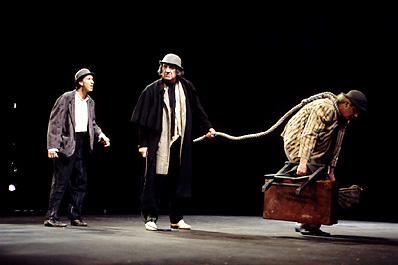Waiting for Godot is an influential and controversial play written by Irish-born author Samuel Beckett. The play was published in 1952 and first staged in 1953. Beckett, a long-time resident of France, wrote Waiting for Godot in French and translated it into English.

Waiting for Godot takes place along an empty road where two tramps named Vladimir and Estragon wait for a mysterious man named Godot. Each day a boy arrives to tell them that Mr. Godot would not appear that day but would come the following day. The tramps pass the time in seemingly trivial activities and meaningless conversation.
Two other characters appear, a rich man named Pozzo and his servant, Lucky. In their first appearance, Pozzo treats Lucky cruelly, driving him like an animal. In the second act, the two return. This time Lucky, who is now mute, leads Pozzo, who is blind. The play ends as it began, with Vladimir and Estragon waiting patiently for Godot to arrive.
Beckett’s drama created great controversy when it first opened because the work departed so radically from traditional drama. Many spectators objected that the play made no sense. It lacked physical action, and the plot did not seem to tie the events together. The mixture of philosophy, Biblical references, broad comedy, and nonsense dialogue also confused many people.
Today, Waiting for Godot is recognized as a classic of modern theater. It has influenced the style of many later dramatists and become a landmark in the movement called the Theater of the Absurd. Critics do not agree on the meaning of the play. For example, some state that it is Beckett’s commentary on the essential lack of meaning in life. Others see the two tramps as symbols of humanity’s determination to survive, even when there is no hope in a bleak and hostile universe. They believe the absent Godot stands for a distant and unresponsive God.
See also Beckett, Samuel; Drama (Theater of the Absurd).
